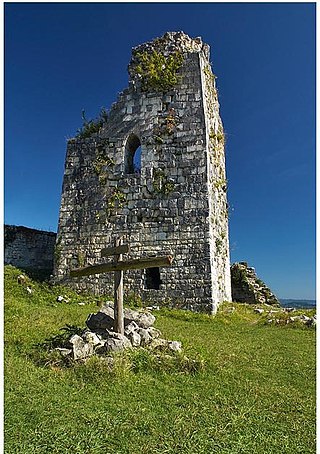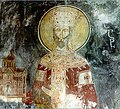The Abkhazia Portal
 |
 |

| |
Abkhazia ( /æbˈkɑːziə/ ⓘ ab-KAH-zee-ə) officially the Republic of Abkhazia, is a partially recognised state, in the South Caucasus, on the eastern coast of the Black Sea, at the intersection of Eastern Europe and Western Asia. It covers 8,665 square kilometres (3,346 sq mi) and has a population of around 245,000. Its capital and largest city is Sukhumi.
The political status of Abkhazia is a central issue of the Abkhaz–Georgian conflict and Georgia–Russia relations. Abkhazia has been recognised as an independent state by Russia, Venezuela, Nicaragua, Nauru, and Syria; however, the Georgian government and nearly all United Nations member states consider Abkhazia a sovereign territory of Georgia. Lacking effective control over the Abkhazian territory, Georgia maintains an Abkhaz government-in-exile.
The region had autonomy within Soviet Georgia at the time when the Soviet Union began to disintegrate in the late 1980s. Simmering ethnic tensions between the Abkhaz—the region's titular ethnicity—and Georgians—the largest single ethnic group at that time—culminated in the 1992–1993 War in Abkhazia, which resulted in Georgia's loss of control over most of Abkhazia and the ethnic cleansing of Georgians from Abkhazia. Despite a 1994 ceasefire agreement and years of negotiations, the dispute remains unresolved. The long-term presence of a United Nations Observer Mission and a Russian-led Commonwealth of Independent States peacekeeping force failed to prevent the flare-up of violence on several occasions. In August 2008, Abkhaz and Russian forces fought a war against Georgian forces, which led to the formal recognition of Abkhazia by Russia, the annulment of the 1994 ceasefire agreement and the termination of the UN mission. On 23 October 2008, the Parliament of Georgia declared Abkhazia a Russian-occupied territory, a position shared by most United Nations member states.
Abkhazia is heavily dependent on Russia: half of its budget comes from Russian aid and much of its state structure is integrated with Russia; it uses the Russian ruble; its foreign policy is coordinated with Russia; and a majority of its citizens have Russian passports.
Refresh
Selected article -
Selected image
Selected biography -
Sergei Uasyl-ipa Bagapsh (4 March 1949 – 29 May 2011) was an Abkhaz politician who served as the second President of Abkhazia from 12 February 2005 until his death on 29 May 2011. He previously served as Prime Minister of Abkhazia from 1997 to 1999. He was re-elected in the 2009 presidential election. Bagapsh's term as prime minister included the 1998 war with Georgia, while he oversaw both the recognition of Abkhazia by Russia and the Russo-Georgian War during his presidency.
Born in 1949 in Sukhumi, Bagapsh became a businessman following the dissolution of the Soviet Union, as well as a representative of Abkhazian interests in Russia. Bagapsh became Prime Minister of Abkhazia in 1997, overseeing a brief, but successful, war with Georgia during a high point of tensions and the displacement of 30,000 Georgian civilians. In 2004, Bagapsh founded the United Abkhazia party in opposition to then-President Vladislav Ardzinba. ( Full article...)List of selected biographies
|
|---|
General images
Did you know?
- ...that the Voronya Cave in the Arabika Massif is currently the world's deepest cave and that its complete depth has not yet been established?
- ...that Lavrentiy Beria, the feared head of the Soviet NKVD, was born in the village of Merkheuli and that he went to school in Sukhumi?
- ...that during the Orange Revolution in the Ukraine, Abkhazia witnessed a very similar political crisis following the 2004 presidential election, which lasted twice as long?
- ...that there is a tiny community of Afro-Abkhazians, descendent from slaves bought centuries ago from the Turks?
Related portals
Things to do
WikiProjects

- WikiProject Abkhazia – a project to improve all articles related to Abkhazia.
- WikiProject Limited recognition – a project that seeks to improve coverage of entities with limited international recognition.
Associated Wikimedia
The following Wikimedia Foundation sister projects provide more on this subject:
-
Commons
Free media repository -
Wikibooks
Free textbooks and manuals -
Wikidata
Free knowledge base -
Wikinews
Free-content news -
Wikiquote
Collection of quotations -
Wikisource
Free-content library -
Wikiversity
Free learning tools -
Wikivoyage
Free travel guide -
Wiktionary
Dictionary and thesaurus
External media
Portals
The Abkhazia Portal
 |
 |

| |
Abkhazia ( /æbˈkɑːziə/ ⓘ ab-KAH-zee-ə) officially the Republic of Abkhazia, is a partially recognised state, in the South Caucasus, on the eastern coast of the Black Sea, at the intersection of Eastern Europe and Western Asia. It covers 8,665 square kilometres (3,346 sq mi) and has a population of around 245,000. Its capital and largest city is Sukhumi.
The political status of Abkhazia is a central issue of the Abkhaz–Georgian conflict and Georgia–Russia relations. Abkhazia has been recognised as an independent state by Russia, Venezuela, Nicaragua, Nauru, and Syria; however, the Georgian government and nearly all United Nations member states consider Abkhazia a sovereign territory of Georgia. Lacking effective control over the Abkhazian territory, Georgia maintains an Abkhaz government-in-exile.
The region had autonomy within Soviet Georgia at the time when the Soviet Union began to disintegrate in the late 1980s. Simmering ethnic tensions between the Abkhaz—the region's titular ethnicity—and Georgians—the largest single ethnic group at that time—culminated in the 1992–1993 War in Abkhazia, which resulted in Georgia's loss of control over most of Abkhazia and the ethnic cleansing of Georgians from Abkhazia. Despite a 1994 ceasefire agreement and years of negotiations, the dispute remains unresolved. The long-term presence of a United Nations Observer Mission and a Russian-led Commonwealth of Independent States peacekeeping force failed to prevent the flare-up of violence on several occasions. In August 2008, Abkhaz and Russian forces fought a war against Georgian forces, which led to the formal recognition of Abkhazia by Russia, the annulment of the 1994 ceasefire agreement and the termination of the UN mission. On 23 October 2008, the Parliament of Georgia declared Abkhazia a Russian-occupied territory, a position shared by most United Nations member states.
Abkhazia is heavily dependent on Russia: half of its budget comes from Russian aid and much of its state structure is integrated with Russia; it uses the Russian ruble; its foreign policy is coordinated with Russia; and a majority of its citizens have Russian passports.
Refresh
Selected article -
Selected image
Selected biography -
Sergei Uasyl-ipa Bagapsh (4 March 1949 – 29 May 2011) was an Abkhaz politician who served as the second President of Abkhazia from 12 February 2005 until his death on 29 May 2011. He previously served as Prime Minister of Abkhazia from 1997 to 1999. He was re-elected in the 2009 presidential election. Bagapsh's term as prime minister included the 1998 war with Georgia, while he oversaw both the recognition of Abkhazia by Russia and the Russo-Georgian War during his presidency.
Born in 1949 in Sukhumi, Bagapsh became a businessman following the dissolution of the Soviet Union, as well as a representative of Abkhazian interests in Russia. Bagapsh became Prime Minister of Abkhazia in 1997, overseeing a brief, but successful, war with Georgia during a high point of tensions and the displacement of 30,000 Georgian civilians. In 2004, Bagapsh founded the United Abkhazia party in opposition to then-President Vladislav Ardzinba. ( Full article...)List of selected biographies
|
|---|
General images
Did you know?
- ...that the Voronya Cave in the Arabika Massif is currently the world's deepest cave and that its complete depth has not yet been established?
- ...that Lavrentiy Beria, the feared head of the Soviet NKVD, was born in the village of Merkheuli and that he went to school in Sukhumi?
- ...that during the Orange Revolution in the Ukraine, Abkhazia witnessed a very similar political crisis following the 2004 presidential election, which lasted twice as long?
- ...that there is a tiny community of Afro-Abkhazians, descendent from slaves bought centuries ago from the Turks?
Related portals
Things to do
WikiProjects

- WikiProject Abkhazia – a project to improve all articles related to Abkhazia.
- WikiProject Limited recognition – a project that seeks to improve coverage of entities with limited international recognition.
Associated Wikimedia
The following Wikimedia Foundation sister projects provide more on this subject:
-
Commons
Free media repository -
Wikibooks
Free textbooks and manuals -
Wikidata
Free knowledge base -
Wikinews
Free-content news -
Wikiquote
Collection of quotations -
Wikisource
Free-content library -
Wikiversity
Free learning tools -
Wikivoyage
Free travel guide -
Wiktionary
Dictionary and thesaurus
External media
Portals








![Image 7Enguri Bridge [ru] over the Enguri river (from Abkhazia–Georgia border)](https://upload.wikimedia.org/wikipedia/commons/thumb/9/9d/Enguri_River_Bridge_2018013.jpg/120px-Enguri_River_Bridge_2018013.jpg)

![Image 9Enguri Bridge [ru] over the Enguri river border (from Abkhazia–Georgia border)](https://upload.wikimedia.org/wikipedia/commons/thumb/4/48/Russian_military_post_at_the_administrative_boundary_line_of_Abkhazia%2C_2016.jpg/120px-Russian_military_post_at_the_administrative_boundary_line_of_Abkhazia%2C_2016.jpg)














